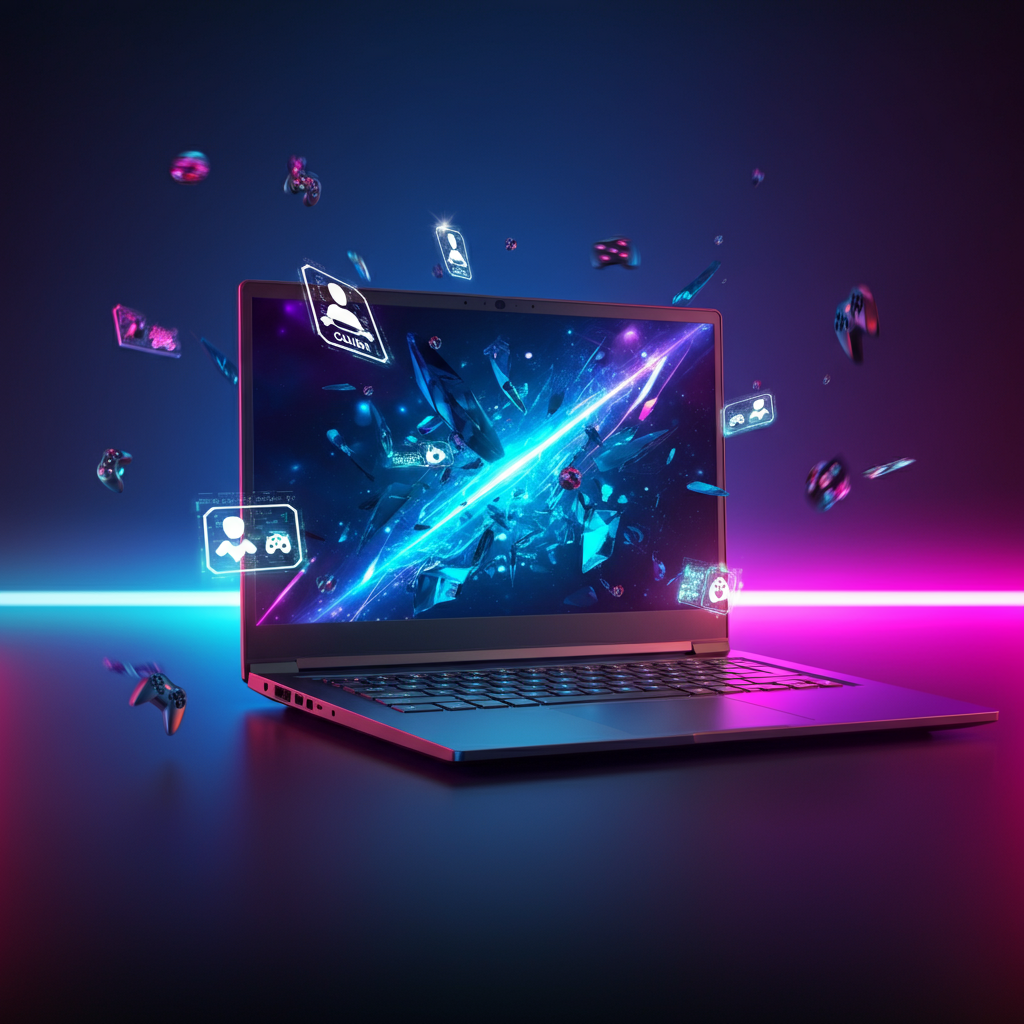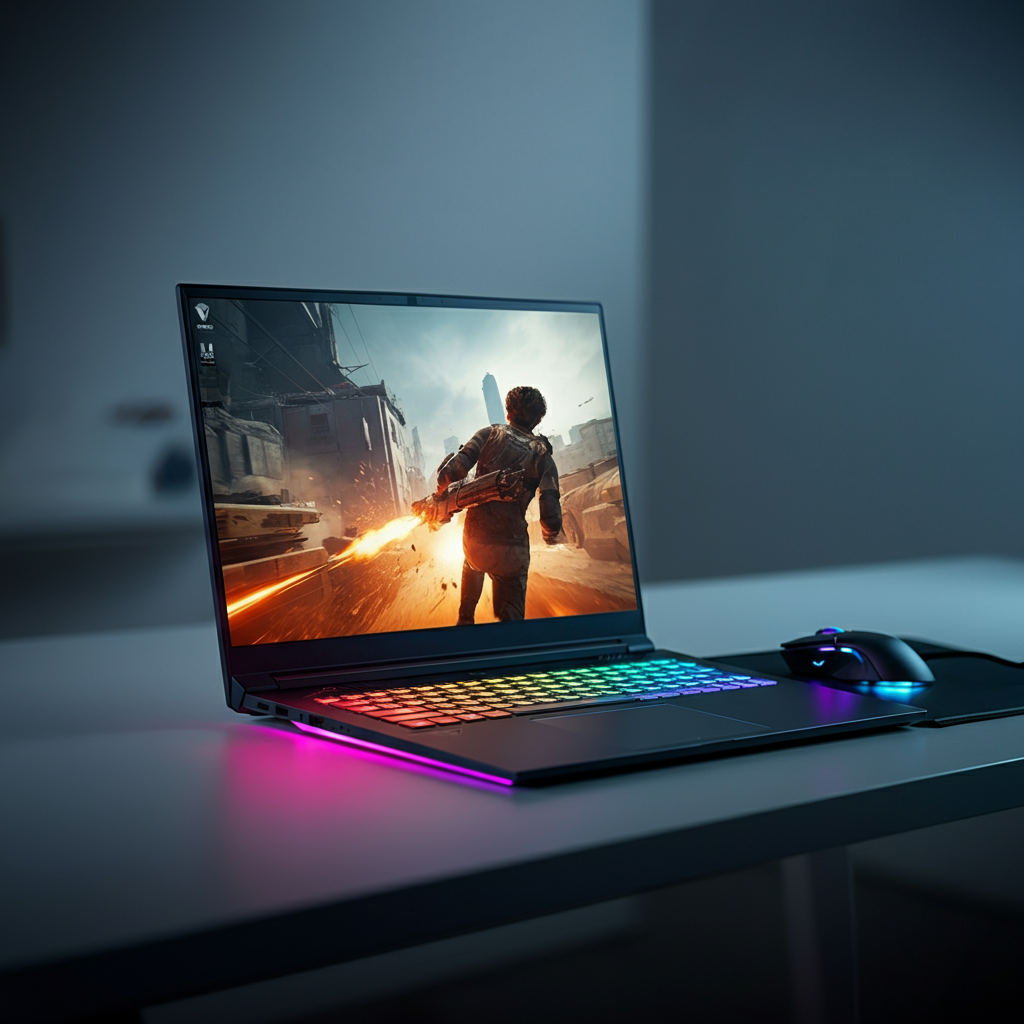Technology
|
20 June 2025
Are Gaming Laptops Worth It? Pros, Cons, and Comparisons
Written by Faizan
Full Stack Developer
Discover if gaming laptops are worth the investment. Explore the pros, cons, and differences between gaming laptops and desktops to find the best fit for your gaming needs.

Table of Contents
Gaming laptops often evoke mixed reactions, with some praising their portability and performance while others question their value compared to desktops.
If you're considering a gaming laptop, understanding its advantages, disadvantages, and whether it suits your lifestyle is critical.
This guide dives deep into whether gaming laptops are worth the investment, providing an unbiased look at their pros, cons, and ideal use cases.
What Are Gaming Laptops?
Gaming laptops are high-performance laptops specifically designed to handle graphically intensive tasks, particularly modern video games.
They come equipped with robust CPUs, dedicated GPUs, and high-refresh-rate displays to provide smooth gameplay. However, this design often comes with a heftier price tag and specific trade-offs.
Advantages of Gaming Laptops
1. Portability and Convenience
One of the standout features of gaming laptops is portability. Unlike bulky desktop setups, gaming laptops are compact and easy to carry.
They allow you to play your favorite games anywhere, whether you're lounging on a couch, traveling, or sitting in a coffee shop. For gamers on the move, this is a game-changer.
- Best For: Students, professionals, or frequent travelers who want a portable gaming experience.
2. All-in-One Package
Gaming laptops come with built-in displays, keyboards, and trackpads, offering everything you need right out of the box.

This eliminates the need for additional gear like external monitors or keyboards, making them a convenient choice for those who don’t want to set up a full gaming station.
If you have more questions realted to How Much Does it Cost to Redesign a Website?Explore Now
3. Great for Non-Gaming Needs
Many gaming laptops are versatile, doubling as powerful workstations. Their high-performance processors and GPUs make them ideal for tasks like video editing, 3D modeling, or running heavy software.
- Example: A gaming laptop with an RTX 3070 GPU can handle complex video rendering tasks or CAD software.
4. Improved Performance and Features
Modern gaming laptops bring desktop-level power in a portable form. Technologies like NVIDIA’s DLSS and AMD’s SmartShift have significantly closed the gap in performance between laptops and desktops, particularly in mid-range and high-end models.
- Cool Features: High-refresh-rate screens (120Hz+), RGB lighting, and advanced cooling systems add to the appeal of gaming laptops.
Disadvantages of Gaming Laptops
1. Price vs. Performance
Gaming laptops are usually more expensive than desktops with similar specifications. For instance, while a gaming desktop with an RTX 3070 GPU might cost $1,500, a laptop with the same GPU could easily go beyond $2,000.
- Reason: The compact design of laptops demands more expensive components and engineering.
2. Limited Upgradeability
One of the biggest drawbacks of gaming laptops is their limited upgrade options. Unlike desktops, where you can easily swap out GPUs, CPUs, or motherboards, laptops typically allow upgrades only for storage and RAM, if at all.
- Impact: If your gaming laptop becomes outdated, you may need to replace it entirely rather than upgrading individual components.
3. Thermal Constraints and Noise
Due to their slim design, laptops often struggle with effective cooling—even those with excellent engineering. This can lead to thermal throttling, where the performance of the laptop is reduced to prevent overheating.
- Highlight: Expect louder fans and frequent overheating during intense gaming sessions.
4. Battery Life
Gaming laptops consume significant power, especially when running AAA games. Expect battery life to last between 1-3 hours during intensive gameplay, necessitating constant charging.
5. Heavier Design
Compared to standard laptops, gaming laptops are bulkier and heavier because of additional components like cooling systems and larger batteries. While they are portable, they aren't as lightweight as traditional ultrabooks.
- Weight Range: 4 to 6 pounds (on average).
Gaming Laptops vs. Desktops
Portability:
- Gaming Laptop: Highly portable, can be used anywhere.
- Gaming Desktop: Completely stationary, requires a dedicated space.
Performance:
- Gaming Laptop: Competitive but often slightly lower than desktop equivalents.
- Gaming Desktop: Offers superior performance at a lower price point.
Upgradeability:
- Gaming Laptop: Limited to RAM and storage upgrades.
- Gaming Desktop: Fully customizable and upgradable.
Price:
- Gaming Laptop: More expensive for similar specifications.
- Gaming Desktop: More cost-effective at the same performance level.
Cooling:
- Gaming Laptop: Prone to thermal throttling due to compact design.
- Gaming Desktop: Superior cooling systems for better heat management.
Verdict
- If you prioritize portability, a gaming laptop is an excellent choice.
- If raw performance and upgradeability are more important and space isn’t an issue, stick with a desktop.
When Are Gaming Laptops Most Suited?

Here are scenarios where investing in a gaming laptop makes sense:
Students and Professionals:
- Balancing academics, work, and gaming becomes seamless with a gaming laptop that serves multiple functions.
Frequent Travelers:
- Ideal for individuals who move between cities or countries but still want to keep gaming on the go.
Small Living Spaces:
- A gaming laptop is perfect for gamers living in dorm rooms or apartments without enough space for a full desktop setup.
Occasional Gamers Seeking Versatility:
- If you game casually but also need a powerful laptop for work or creative projects, a gaming laptop is a better fit than investing in both a desktop and ultrabook.
Tips for Buying a Gaming Laptop
When choosing a gaming laptop, consider the following factors:
GPU and CPU:
- Look for powerful GPUs like NVIDIA RTX 3060 and above, and CPUs such as Intel i7 or AMD Ryzen 7 for future-proofing.
RAM:
- Stick to 16GB of RAM or more for smooth multitasking and gaming.
Display:
- High refresh rates (120Hz or 144Hz) improve the gaming experience, especially for fast-paced titles.
Storage:
- Opt for laptops with SSD storage (at least 512GB) for faster loading times and sufficient game storage.
Cooling Features:
- Choose models with advanced cooling solutions to prevent overheating.
Battery Life:
- If gaming on the go is your priority, look for models known for better power efficiency.
For curated options, check out international buying guides on gaming laptops.
Final Thoughts
Are gaming laptops worth it? The answer depends on your specific needs. For those who value portability, all-in-one functionality, and don’t mind spending more for the convenience, gaming laptops are absolutely worth the investment.
On the other hand, if you’re looking for better long-term value, upgradability, and raw power at a lower cost, desktops remain the champion.
Understanding when and how you'll use the device is the key to making the best decision. Whether it’s a laptop or desktop, one thing is certain: your gaming experience depends as much on the hardware as it does on your personal preferences.
FAQ: Are Gaming Laptops Worth It?
1. What are the main advantages of gaming laptops?
- Portability allows you to game anywhere.
- All-in-one package; no need for extra gear.
- Doubles as a powerful workstation for tasks like video editing or 3D modeling.
- High-performance components like advanced GPUs and high-refresh-rate displays.
2. What are the drawbacks of gaming laptops?
- Limited to upgrades like RAM and storage.
- Prone to thermal throttling during long gaming sessions.
- Short battery life, especially during heavy use.
- More expensive compared to desktops with similar specs.
3. Are gaming laptops good for everyday use?
Yes, most gaming laptops are versatile enough for tasks like browsing, office work, video editing, and more due to their robust specs.
4. How do gaming laptops compare to desktops?
- Portability: Laptops win with their mobility.
- Performance: Desktops often deliver better bang for your buck.
- Upgradeability: Desktops are fully upgradable, while laptops are limited.
- Price: Desktops tend to be more cost-effective for the same performance level.
5. Who should buy gaming laptops?
- Students and professionals seeking a dual-purpose device.
- Frequent travelers or those needing gaming on the go.
- Individuals with limited space, such as dorm rooms or small apartments.
6. Do gaming laptops overheat easily?
Yes, due to their compact design and powerful components. However, premium models often include advanced cooling systems to mitigate this issue.
7. Can gaming laptops run AAA games?
Absolutely. High-quality gaming laptops with GPUs like the NVIDIA RTX series can handle AAA games smoothly, often at high or ultra settings.
8. Is it possible to upgrade a gaming laptop?
Typically, upgrades are limited to RAM and storage. Components like the GPU and CPU are usually fixed and cannot be replaced.
9. Are gaming laptops worth the price?
- If you need a portable, high-performance device, they are worth it.
- For pure performance and future-proofing, desktops might offer better value.
10. What should I look for in a gaming laptop?
- GPUs like NVIDIA RTX 3060 or higher.
- At least 16GB RAM and SSD storage of 512GB or more.
- High-refresh-rate display (120Hz or 144Hz).
- Efficient cooling systems for long gaming sessions.
11. How long do gaming laptops usually last?
Typically, gaming laptops can last 3-5 years with proper care, though competitive gaming needs may require upgrades sooner.
12. What about battery life for gaming laptops?
Most gaming laptops provide 1-3 hours of battery life under heavy gaming loads. Lighter tasks, such as browsing or media consumption, may extend it to 4-6 hours.
13. Can gaming laptops replace desktops?
While gaming laptops provide portable convenience, they lack the customization and long-term upgradability of desktops. For stationary, power-focused users, desktops remain a better option.
Revolutionize Your Workflow with Transcripter
Ready to streamline your content creation?
